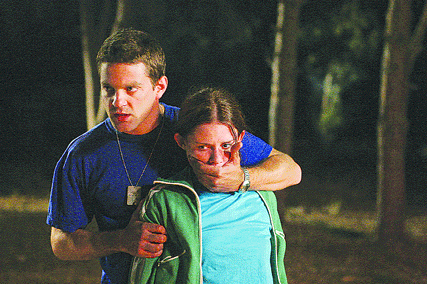Israeli film “Campfire” charts a family climb out of the inertia loss brought on
It has been an unprecedented year for Israeli films. “Campfire” is the seventh Israeli movie to find itself in U.S. distribution––a real feat for Israeli cinema in general, as most of whose films are usually only seen in the U.S. at film festivals.
Any film coming out of Israel has to live up to a pervasive expectation that the Israeli-Palestinian conflict is going to play a part in the film (think “Wall”), or perhaps other fraught topics such as the Holocaust (which loomed large in the other big Israeli film of the year, “Walk on Water”). So it’s interesting to see a film like “Campfire,” which puts the political behind the personal, creating broader appeal for this story of a widow and her daughters a year after her husband has died.
The film is set in 1981 in Jerusalem. Rachel Gerlik (Michaela Eshet) has let her late husband’s Peugeot sit inert in front of their apartment building for a year, but finally puts an ad in the paper to sell it. She instructs her daughters to tell prospects, “My father isn’t home,” in order to avoid being taken advantage of as a widow.
With a year of mourning behind her, Rachel decides to let her yenta friend Shula set her up on a blind date with Yossi (Moshe Ivgy), a 50-something virgin who has practically first-dated everyone turned his way. Meanwhile, Rachel’s contentious daughter Esti (Maya Maron) is sneaking boys into the apartment, or making out with them in the building basement, while 15-year-old Tami (Hani Furstenberg) endures sexual taunts from geeky boys.
Feeling she needs a change, Rachel applies to be part of a right-wing Zionist group that wants to form a settlement in the West Bank. She tries to reassure her friends, Shula and Motke, that she can meet the group’s standards, since she is a woman alone with two daughters. Perhaps this is why she agrees to go out with the men Shula sets her up with. Rachel comes across as fairly static and self-absorbed, so it’s not clear why she would leave a nice apartment to go live in a trailer in hostile territory.
During a holiday bonfire camp-out, Tami is grabbed by one of the older boys, who has told the younger teens, “They say no, but they wind up relenting.” The camera doesn’t show us exactly what happens, but Tami is clearly left with a “bad reputation.” Rachel catches wind of what’s happening, but Motke advises her to not make a big deal about it. Tami is left alone to make a choice between reporting her assailants or dealing with the problem with only her own wits.
Tami’s situation is mirrored by her mother’s predicament—having married young a man she didn’t necessarily love, Rachel is now free but unsure how to proceed with her life. “Campfire” evokes the dilemma of women around the world who seek to be free in societies that only take them seriously when a a man is involved. But, much like the Peugeot in the driveway, all Rachel and her daughters really need is a good jolt. Things start to change when Esti answers the phone one day and finally says, “My father’s dead, so if you want the car, you have to deal with my mother.”
Director Joseph Cedar sets up a story that unfolds in real time under circumstances to which anyone can relate. Furstenberg delivers a particularly strong performance, evoking both the joys and the terrors of being a teenager. In a wonderful scene, while home alone, she turns a pop song up really loud and does her own vampy version of what she thinks a femme fatale should be—shades of the Tom Cruise turn two decades ago in “Risky Business.” Her release strikes a nice counterpoint to her silence when meeting her tormentors and her reflexive obedience to her mother’s requests.
Cedar captures the zeitgeist of the times in Israel, but the couple who lead the Zionist group are a stand-in for society at large, their sexually curious son representing the naive male notion that all women “want it,” and the settlement echoeing Rachel’s painful year of isolation. Cedar shows his characters’ progression toward taking charge of their lives using a lot of close ups that reveal Tami and Rachel’s emotional awakening.
Throughout the movie, Tami says, “This year, I will be happy.” Cedar shows that achieving this not a matter of getting past a milestone, or fitting in, but discovering that you create your own happiness.
Campfire is also being screened at the Manhattan Jewish Community Center, 334 Amsterdam Avenue at 76th Street through September 13. For times and tickets, call 646-505-5708 or visit jccmanhattan.org.
gaycitynews.com

































